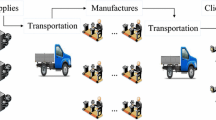Abstract
A constructive heuristic for the permutation flow shop scheduling problem with the objective of minimizing total completion time is proposed in this paper. It is constructed using a population-based technique and also the insertion rule similar to that presented in the Nawaz–Enscore–Ham (Omega 11:91–95, 1983) heuristic for the makespan criterion. We show, through computational results, that the proposed heuristic performs better than the heuristic of Woo and Yim (Comput Oper Res 25:175–182, 1998) for small and large problem sizes and the heuristic of Framinan and Leisten (Omega 31:311–317, 2003) for small and medium problem sizes. However, the relative performance of the heuristic of Framinan and Leisten improves compared to the proposed method when the job size increases. The time complexity of the proposed method has been shown to be less than those required by the existing heuristics. The average CPU time of the proposed heuristic is significantly less than the heuristic of Framinan and Leisten for large jobs.
Similar content being viewed by others
References
Baker KR (1974) Introduction to sequencing and scheduling. Wiley, New York
Pinedo M (1995) Scheduling: theory, algorithms, and systems. Prentice Hall, Englewood Cliffs
Framinan JM, Leisten R (2003) An efficient constructive heuristic for flowtime minimization in permutation flow shops. Omega 31:311–317
Garey MR, Johnson DS, Sethi R (1976) The complexity of flowshop and jobshop scheduling. Math Oper Res 1:117–129
Srikar BN, Ghosh S (1986) A MILP model for the n-job, m-stage flow shop with sequence dependent set-up times. Int J Prod Res 24:1459–1474
Bestwick P, Hastings N (1976) A new bound for machine scheduling. Oper Res Q 27:479–487
Liu J, Reeves CR (2001) Constructive and composite heuristic solution of the P||∑Ci scheduling problem. Eur J Oper Res 132:439–452
Allahverdi A, Aldowaisan T (2002) New heuristics to minimize total completion time in m-machine flowshops. Int J Prod Econ 77:71–83
Li X, Wang Q, Wu C (2009) Efficient composite heuristics for total flowtime minimization in permutation flow shops. Omega 37:155–164
Framinan JM, Leisten R, Ruiz-Usana R (2005) Comparison of heuristics for flowtime minimization in permutation flowshops. Comput Oper Res 32:1237–1254
Woo DS, Yim HS (1998) A heuristic algorithm for mean flow time objective in flowshop scheduling. Comput Oper Res 25:175–182
Rajendran C, Ziegler H (1997) An efficient heuristic for scheduling in a flowshop to minimize total weighted flow time of jobs. Eur J Oper Res 103:129–138
Zhang Y, Li X, Wang Q (2009) Hybrid genetic algorithm for permutation flowshop scheduling problems with total flowtime minimization. Eur J Oper Res 196:869–876
Rajendran C, Ziegler H (2004) Ant-colony algorithms for permutation flowshop scheduling to minimize makespan/total flowtime of jobs. Eur J Oper Res 155:426–438
Rajendran C, Ziegler H (2005) Two ant-colony algorithms for minimizing total flowtime in permutation flowshops. Comput Ind Eng 48:789–797
Tasgetiren MF, Liang YC, Sevkli M, Gencyilmaz G (2007) A particle swarm optimization algorithm for makespan and total flowtime minimization in the permutation flowshop sequencing problem. Eur J Oper Res 177:1930–1947
Rajendran C, Chaudhuri D (1991) An efficient heuristic approach to the scheduling of jobs in a flowshop. Eur J Oper Res 61:318–325
Gupta J (1972) Heuristic algorithms for multistage flowshop scheduling problem. AIIE Trans 4:11–18
Miyazaki S, Nishiyama N, Hashimoto F (1978) An adjacent pairwise approach to the mean flow time scheduling problem. J Oper Res Soc Jpn 21:287–299
Rajendran C (1993) Heuristic algorithm for scheduling in a flowshop to minimize total flow time. Int J Prod Econ 29:65–73
Ho JC (1995) Flowshop sequencing with mean flowtime objective. Eur J Oper Res 81:571–578
Laha D, Sarin SC (2009) A heuristic to minimize total flow time in permutation flow shop. Omega 37:734–739
Ho J, Chang Y (1991) A new heuristic for the n-job, m-machine flowshop problem. Eur J Oper Res 52:194–202
Nawaz M, Enscore E, Ham I (1983) A heuristic algorithm for the m-machine, n-job flowshop sequencing problem. Omega 11:91–95
Karg R, Thompson G (1964) A heuristic approach to solving traveling salesman problems. Manage Sci 10:225–248
Campbell H, Dudek R, Smith M (1970) A heuristic algorithm for the n-job, m-machine sequencing problem. Manage Sci 16:630–637
Wu CC, Lee WC (2009) A note on the total completion time problem in a permutation flowshop with a learning effect. Eur J Oper Res 192:343–347
Cormen TH, Leiserson CE, Rivest RL (1990) Introduction to algorithms. MIT Press, Cambridge
Author information
Authors and Affiliations
Corresponding author
Rights and permissions
About this article
Cite this article
Laha, D., Chakravorty, A. A new heuristic for minimizing total completion time objective in permutation flow shop scheduling. Int J Adv Manuf Technol 53, 1189–1197 (2011). https://doi.org/10.1007/s00170-010-2895-9
Received:
Accepted:
Published:
Issue Date:
DOI: https://doi.org/10.1007/s00170-010-2895-9




